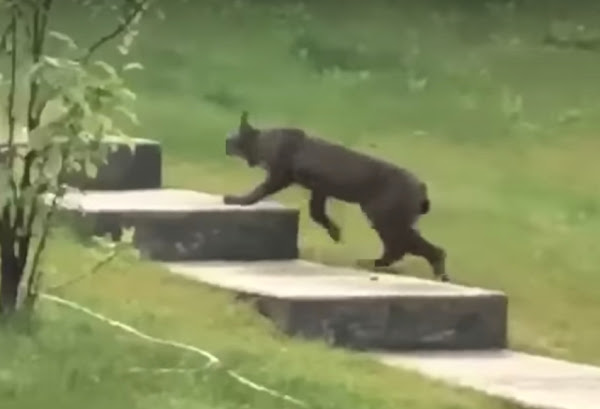The footage is shaky, the clip is only thirty seconds long, and the audio is entirely dominated by the barking of an overexcited dog, but none of that matters much. In the centre of the frame, sitting upright on a residential lawn is a pitch-black Canada lynx, the only one of its kind to have ever been captured on camera.
The clip was captured in Canada's Yukon about eight kilometres southeast of Whitehorse in 2020, but was only recently released in an article by Thomas Jung, a researcher at the University of Alberta.
The dark-coated lynx was filmed on a cellphone from around 50 metres away, hence the shaky, pixellated video. Jung explained in the article, published in the journal Mammalia that the lynx seemed relatively unperturbed by the presence of humans, but "likely left the area due to the dog’s barking."
Several Canada lynx experts were consulted to help positively identify the animal and, despite the low-resolution video, they confirmed it was indeed a melanistic lynx. Screenshots from the clip show whitish, grey hairs across the cat's body that are more pronounced on its face and back.
Given the quality of the photos and video, a detailed examination of coat colour was not possible, Jung explains, but notes that the observation is still of "scientific value with respect to documenting coat colour aberrations in the genus Lynx."
Canada lynx typically sport a silver-grey coat in winter which turns reddish brown in summer. Although there are a handful of records of cats with a bluish grey pelage, Jung's discovery marks the first time a black lynx has been documented.
Elsewhere, dark-coloured wild cats are not unheard of. Around one third of all felids are reported to show signs of melanism, a genetic condition that gives rise to black coats. In some cases, the inky colouration may help the cats blend into the dappled light of their forested habitats, but it's unclear if melanism would help or hinder a lynx. If stalking on recently burned boreal forests, a darker coat could help the lynx blend in, but Jung theorises that it would affect the cat's ability to hunt on snow-covered landscapes.
"Melanistic individuals would be at a distinct disadvantage when hunting hares during winter. Indeed, with increased competition by coyotes (Canis latrans) a concern for Canada lynx encountering increasingly shallow snow as a result of climate change, the added disadvantage of lost camouflage to melanistic lynx hunting hares during winter would likely result in melanism being maladaptive."
VIDEO
The clip was captured in Canada's Yukon about eight kilometres southeast of Whitehorse in 2020, but was only recently released in an article by Thomas Jung, a researcher at the University of Alberta.
The dark-coated lynx was filmed on a cellphone from around 50 metres away, hence the shaky, pixellated video. Jung explained in the article, published in the journal Mammalia that the lynx seemed relatively unperturbed by the presence of humans, but "likely left the area due to the dog’s barking."
Several Canada lynx experts were consulted to help positively identify the animal and, despite the low-resolution video, they confirmed it was indeed a melanistic lynx. Screenshots from the clip show whitish, grey hairs across the cat's body that are more pronounced on its face and back.
Given the quality of the photos and video, a detailed examination of coat colour was not possible, Jung explains, but notes that the observation is still of "scientific value with respect to documenting coat colour aberrations in the genus Lynx."
Canada lynx typically sport a silver-grey coat in winter which turns reddish brown in summer. Although there are a handful of records of cats with a bluish grey pelage, Jung's discovery marks the first time a black lynx has been documented.
Elsewhere, dark-coloured wild cats are not unheard of. Around one third of all felids are reported to show signs of melanism, a genetic condition that gives rise to black coats. In some cases, the inky colouration may help the cats blend into the dappled light of their forested habitats, but it's unclear if melanism would help or hinder a lynx. If stalking on recently burned boreal forests, a darker coat could help the lynx blend in, but Jung theorises that it would affect the cat's ability to hunt on snow-covered landscapes.
"Melanistic individuals would be at a distinct disadvantage when hunting hares during winter. Indeed, with increased competition by coyotes (Canis latrans) a concern for Canada lynx encountering increasingly shallow snow as a result of climate change, the added disadvantage of lost camouflage to melanistic lynx hunting hares during winter would likely result in melanism being maladaptive."
VIDEO




Responses to "Black Canada Lynx Caught On Camera For First Time"